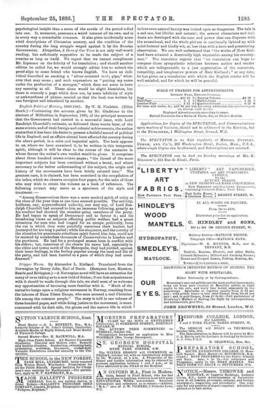English Political History, 1880-1885. By W. M. Pimblett. (Elliot Stock.)—Contrasting
the account given by Mr. Gladstone to the electors of Midlothian in September, 1885, of the principal measures that the Government had carried to a successful issue, with Lord Randolph Churchill's estimate, as delivered three weeks later, of the same events, and of their foreign and colonial achievements, the author states that it has been his desire to present a faithful record of political life in England, and as affairs abroad have affected the country during the above period, in a calm and impartial spirit. The book appears to us, where we have examined it, to be written in this temperate spirit, although it will be clear in the course of the narrative in whose favour the writer's own verdict would be given. It comprises about three hundred crown-octavo pages ; "the thread of the more important subjects has been continued without a break, and where necessary to the better understanding of the subject, the origin and history of the movements have been briefly entered into." The greatest care, it is claimed, has been exercised in the compilation of the index, which we observe occupies four pages, for the sake of those who may wish to retain the volume as a book of reference. The following extract may serve as a specimen of the style and treatment :—
" Among Conservatives there was a more marked spirit of unity at the close of the year than at one time seemed possible. The activity, boldness, nay, unprecedented audacity, one may say, of Lord Ran- dolph Churchill had secured to him an immense following, greatly as his conduct had shocked the steadier-going members of the party. He had begun to speak of Democracy and to favour it ; and his broadening views on subjects affecting public welfare had a great attraction for men who had longed for an escape, politically, from the rut in which they were painfully conscious their leaders had journeyed for too long a period ; while his eloquence, and the novelty of the situation his passionate rebellions spirit forced him into, could not be resisted by numberless thousands of Conservatives in London and the provinces. He had for a prolonged season been in conflict with his elders ; but, conscious of the charm his name had, especially in the cities and towns north of the Metropolis, they had yielded, against their inner feelings, to the feeling popular among the rank and file of the party, and had been hurried at a pace of which they had never dreamed."


































 Previous page
Previous page